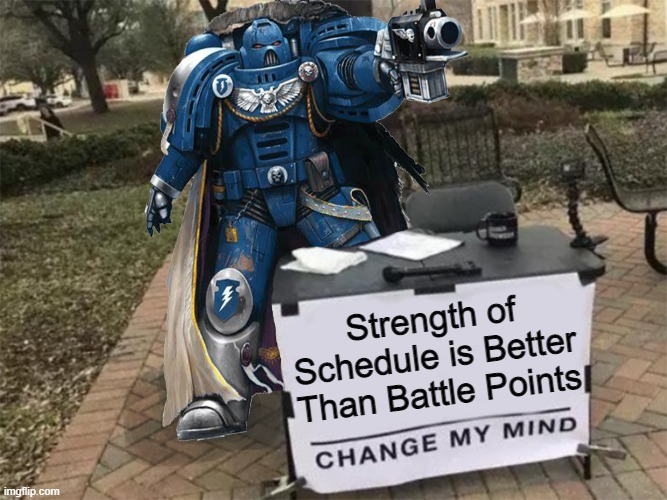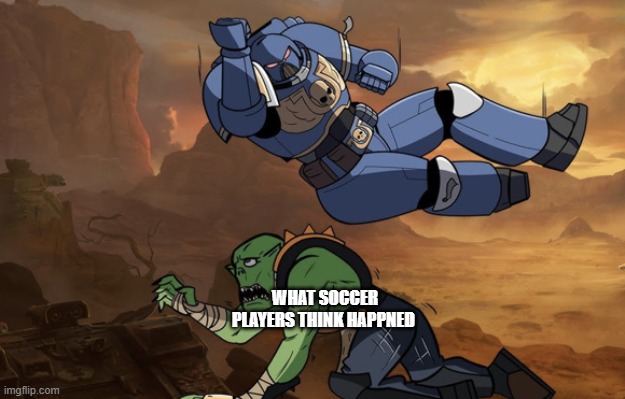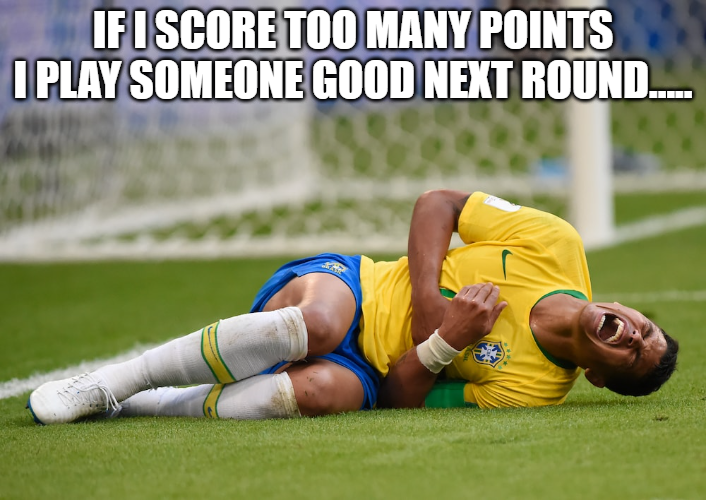I played a practice game for an upcoming RTT with a very good player in my local meta, and as his Necrons stomped on my poor Blood Angels we had a very interesting conversation. During the game, we got into a conversation about the World Cup. Mainly the conversation revolved around how these incredibly talented athletes threw themselves to the ground and put on Oscar winning performances at the slightest hint that they may have been fouled. A lot of people joke that soccer players aren’t tough, but that obviously isn’t the case. These dudes run for miles, throw their head up to hit the ball, and slide tackle other players when the game calls for it, so why do they all of a sudden become human water fountains of tears when someone from the other team gently brushes their jersey? The answer is the game rewards this kind of behavior. If throwing a mini-tantrum on the field can get your team an advantage than it is worth looking a little ridiculous. Gamesmanship, as this is generally known as, is no stranger to competitive 40k.
Many 40k tournaments use Battle Points as a tie breaker within the rankings, and this can lead to some situations exactly like the acting we see displayed on the soccer field. Battle Points incentivizes beating your opponent with as many points as possible, but it also can be advantageous to keep your score low in order to not play the highest scoring players in the next round. The 40k community saw this occur at a tournament where a player was winning a game handedly, but then moved off Objectives to lower their score in order to not play the highest scoring players in the next round. This is gamesmanship at its finest, and according to the rules there is nothing wrong with this behavior. The community should not react negatively to the player who is using the game to give themselves the best chance at winning an event in this situation, but should instead look at the rules within the game that incentivized this behavior.
There is a better way to rank tie breakers within 40k tournaments that does not have the downsides of Battle Points. By using Strength of Schedule as a tie breaker players are rewarded for playing and beating the players with the best records. This tie breaker looks at players opponent win records within the tournament, with higher opponent win rates granting higher placements within the tournament.
A tournament in my own local scene used Strength of Schedule as a tie breaker earlier this year, and it was met with some criticism. Some players argued that they had no control over how their opponents performed throughout the event, and should not be penalized due to not playing the best players. The reverse of this is that you also have no control over how many Battle Points other players score in their games either. The harsher answer to this critique is simple, win your games and it won’t matter. If someone is playing lower tier players during a tournament, and they are someone who is in a place to win an event, they should be winning their games.
Strength of Schedule tie breaking also solves some other issues in competitive 40k. Many players have been in a game where they are either beating their opponent so badly, or their opponent is beating them so badly, that the game is no longer enjoyable for either player. Under the Battle Points tie breaker these games still need to be played out. Those extra points could matter to both players at the end of the day, but under the Strength of Schedule tiebreaker these situations become much easier to stomach. In a tournament earlier this year that used Strength of Schedule tiebreaker my GSC got absolutely obliterated over two turns of Tau shooting. Rather than play a meaningless game to get a few more points, my opponent and I got to have an extremely engaging conversation about our hobby and the things we loved about it. Instead of ending in salt our game ended in my opponent wishing me good luck in my remaining games, and he actually meant it!
No tiebreaking method is without issues, but Strength of Schedule presents less issues than the Battle Points tiebreaker that is most common. No players should be forced to play out a game they aren’t enjoying, and talking out games can lead to some interesting end of game points guesses. While you may not have control over your opponent’s skill level, just keep winning your games, and you will be sure to play players with the highest Strength of Schedule as the rounds progress.
If you are preparing for an upcoming tournament, or are looking to start getting terrain and mats for events of your own, check out FLGs webstore for some awesome discounts on Games Workshop products!




The problem comes to enforcement.
How can you seperate a player deliberately moving off an objective for no reason to game the system.
Vs a player who has made a tactical choice their opponent/judge hasn’t considered maybe to position for the following turn to deal with a threat because they don’t need to maximise there battle points and maybe having a slightly lower score but guaranteeing the win is better than a higher score but leaveing your opponant an outside chance. Or because your a “timmy” type player and want to stomp your opponent not “spike” your maximum score.
Vs a player who is inexperienced an Higher up than they should be due to lucky matchups/dice and has gone kill crazy forgetting the objectives.
Vs the player that is intoxicated/tired/not concentrating or just making stupid mistakes.
Rules need to be enforceable at all levels and fairly and sure you might find a black and white case at the top table round 5 of a major but as soon as you start applying those standards to the middle or lower tables your going to have chaos.
Add to that how do you fix the issue based on a subjective call. sure you can yellow card in some rare black and white circumstances but that doesn’t fix the scores or remove the incentive. That just encourages football player like trying to subtley game it. You could give one player extra battle points but then your going to upset both players in that game because the innocent player is rewarded when there opponent messes up. How would you feel if you felt your opponent messed up in a 70 60 game and the judge came along and awarded 10 extra battle points to them and that messed up your differential. Equally awarding a game loss unfairly rewards the player who legitimately lost. While disqualification ruins someone’s experience especially if it was a genuine error only the judge thought it was deliberate.
I would also add strength of schedule doesn’t fix the issue you only have to look at MTG and the final round being almost all intentional drawing to see that.
Early losses/poor scores have vastly more impact on strength of schedule because they effect each subsequent. Equally those rounds are the most random in terms of strength of your opponent – its easy for a bad player to luck through round 1 its not easy for them to luck through round 1-5.
Pairing fixing is more of a concern late rounds and at round 6 four of my scores are locked in fixing 5 won’t make much of a difference to strength of schedule but a having a better pairing canapé a huge difference so the incentive is still there.
Finally playing the game out to maximise battlepoints ensures both players have the maximum time playing the game they enjoy warhammer and trying to play it aswell as they can. There is nothing worse than playing one turn and having your opponent capitulate giving you two hours of waiting with nothing to do when you came to play a game and as any experienced player knows there are games you thought you lost early but turned around as dice are fickle things.
In short strength of schedule doesn’t prevent match fixing it encourages it late in the event when it matters most. It discourages playing games to the best of your ability even when your going to lose. Which has the adverse impact of punishing winning players whose losing opponent’s choose to make it as hard for them as possible.
Perhaps the simplest “repair” isn’t long winded. Perhaps the easy fix is to have levels of tournaments…major grand etc etc but what that means is you need to be at a win rate % above 50 perhaps…all others need not apply…same for other tournaments (TO sets the win % level publishes it and anyone not qualified for being an appropriate tier % winner …can’t play) imagine going to a Tournament with regular % “Joes” that don’t go weekly to every stinking event possible…eventually the percents fall into place and skill levels are in that range just like your skill level whatever that may be. Just a thought. Start there. Tier 1 Tier 2 etc. Just like they do already but battle point total for xxxx time frame don’t mean squat…but if you score 100/100/100 win a low tier event guess what…you just bumped yourself up a tier.
The World Cup itself uses a specific format that may provide an provide an unbiased, impartial, alternative method for tournament progression that would fix this issue entirely.
Each Player (Team) is randomly drawn from a hat, and sorted into one of 8 groups (pods) who play eachother once. Players score 3 points for a win, 1 point for a draw, no points for a loss. In Football/Soccer, Goal Difference is the tie breaker to rank teams with the same points, you subtract the points (goals) scored againts the player from the points (goals) scored by the player to find your Points (Goal) Difference score should it be needed for tie breaks. The top two teams in each group progress to the knock out stages, the winners of the group play the runners up of another group and vice versa, the loser is out of the competition, and the winner progresses to the next round. The remaining Players play against eachother as before until the winner is decided.
Deliberately scoring less in this model to finish 2nd in the group will only get you paired with a stronger opponent in the knock out stages, disincentivising gaming the tournament.
I’ve been in the tournament scene of Magic the gathering for decades and I agree strength would be a better option. And the mentioned ID only comes when there is a separate top x who battle again, so not really a big issue.